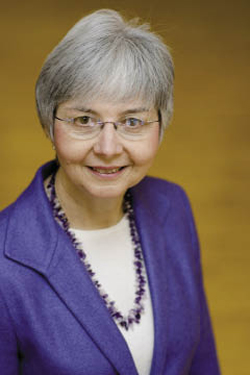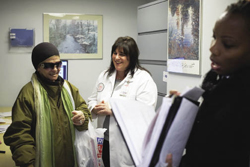In the Patient's Corner
A new program will seed a corps of certified diabetes educators.
For a diabetic whose doctor wants her to self-inject insulin every day, that’s a serious problem. And even if da Silva, who lives alone, could overcome her fears, she still would have to contend with a case of carpal tunnel syndrome that makes it all but impossible for her to give herself insulin shots.
Diabetes afflicts nearly 24 million people in the United States, and with a steep rise in pediatric cases in recent years, that number could double by 2050. Yet as da Silva’s story demonstrates, the numbers are only part of the problem. A group of diseases stemming from the body’s inability to produce or use insulin (a hormone that processes the glucose in foods), diabetes can pose serious health risks, such as amputation and vision impairment. Managing the disease requires addressing a combination of medical and lifestyle factors that can include depression, anxiety, socialization issues, sleep and sexual dysfunction, insulin resistance and problems with adherence to medication.
Busy primary care physicians typically have neither the time to keep current on all of the rapidly changing information about diabetes nor the behavioral expertise to help patients fight the disease day to day.
“You need a diabetes educator—a clinician with a strong knowledge base in health behavior studies who can look at things from the perspective of a patient,” says TC alumna Melissa Scollan-Koliopoulos, Assistant Professor of Medicine at New Jersey Medical School and Assistant Professor of Nursing at Rutgers, who works with Martha da Silva. “Every patient needs an individualized plan that covers the cognitive, psychosocial and physical aspects of managing the disease.”
With Certified Diabetes Educators (CDEs) in short supply, Teachers College—at Scollan-Koliopoulos’ suggestion—will launch a new master’s Diabetes Education and Management program in the fall of 2011. The program—the first to confer a degree—will be open to a range of professionals, including nurses, pharmacists and dietitians.
“The American Association of Diabetes Educators, which helped us put this together, is a multidisciplinary organization,” says Kathleen O’Connell, TC’s Isabel Maitland Stewart Professor of Nursing Education, who will direct the new program. “They were particularly interested in a program that did not just train nurses or dietitians or one clinical group. Teachers College is perfect for that because we have multiple disciplines working together, ranging from health and nutrition to adult education.”
TC’s program, which grew out of a seed grant from the College’s Provost Investment Fund and recently received a generous pledge from TC trustee and alumna Marla Schaefer (M.A.,’03) through the Rowland and Sylvia Schaefer Family Foundation, will provide a formal career path in a field where, until now, many practitioners have had to forge their own.
“I had to find a mentor, and say, ‘Hey, I want to do what you do,’” recalls Scollan-Koliopoulos, who at one point even started her own self-study program. “I learned all I could and then started my own practice counseling people with diabetes.” She marketed her services to physicians until, eventually, she was hired by the Joslin Center at St. Barnabas Medical Center in Livingston, New Jersey. Others in the field have operated out of stand-alone facilities, run education groups in doctor’s offices or even worked from churches or laundromats.
Certification is a particularly tough challenge for diabetes educators, who cannot be reimbursed by Medicare or third-party insurers without it. The National Certification Board of Diabetes Educators (NCBDE) certifies clinicians who have logged 1,000 hours working as a diabetes educator and who have passed an exam. The AADE offers certification in advanced diabetes management. Yet piecing together the required courses—and finding the time to take them—can be especially difficult.
TC’s program responds to both those challenges. Offered entirely online, the program will be accessible to clinicians all over the country.
“People who will be interested are very busy professionals,” says consultant and TC Visiting Scholar Joyce Vergili, another former student of O’Connell’s who helped to develop the program. “If they don’t have to carve out time for commuting it will be more attractive to them.” The program doesn’t guarantee certification, but O’Connell has proposed to the NCBDE that it count hours preceptored under TC’s aegis towards the organization’s 1,000-hour requirement.
Above all, though, students will graduate from the program with a wealth of knowledge and the skills necessary to handle a very complicated job.
Scollan-Koliopoulos herself will teach a course on Behavior Change Strategies for Diabetes Prevention and Control, which will cover lifestyle factors that predict how a person will manage his or her own illness. Other
courses include:
- Pathophysiology of Diabetes and its Complications, which will provide in-depth knowledge of why diabetes affects the body as it does. This is essential ground for diabetes educators, who must not only be able to advise their patients, but also interface with medical professionals. (“If your patient has vision problems, you’ll end up in a conversation with an ophthalmologist,” Vergili says. “So you have to know the whole structure and function of the eyeball.”);
- Preventive and Therapeutic Interventions in Diabetes Management, which focuses on nutrition, exercise and other strategies for preventing pre-diabetes from becoming diabetes, and for preventing both acute and chronic complications in those who already have diabetes, and;
- Diabetes Self Management Education, which covers Medicare requirements necessary for reimbursement —essential, Vergili says, “so that you can actually make a living doing diabetes education.”
“I know I need the injections, but for me, it’s still a needle sticking in my body,” da Silva says.
She hasn’t solved the problem yet, but she’s got some very good people in her corner.
Published Wednesday, May. 11, 2011

